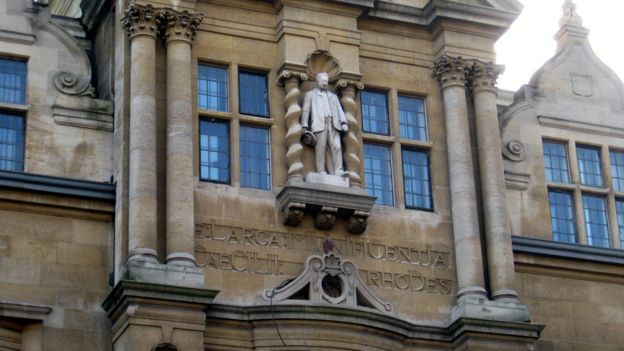
Source: BBC
Former South African President FW De Klerk has criticised a campaign to remove a statue of Cecil Rhodes at Oxford University's Oriel College.
Campaigners say the statue venerates the 19th Century colonialist and the values he stood for.
Former Australian PM Tony Abbott has also saith the statue should stay.
Mr Abbott, a Rhodes Scholar, said removing the statue would "substitute moral vanity for fair-minded enquiry".
Upon his death, Cecil Rhodes, who attended Oriel College, left a legacy which has funded the university's prestigious Rhodes Scholarships - postgraduate awards for non-British students.
Mr De Klerk, in a letter to the Times newspaper, said that "for better or worse", Rhodes had made an impact on history, which included the positive contribution of his scholarship scheme.
"If the political correctness of today were applied consistently, very few of Oxford's great figures would pass scrutiny," he said.
He pointed out that Rhodes had been "the architect of the Anglo-Boer War that had a disastrous impact on our people, yet the National Party government never thought of removing his name from our history".
The college, he said, should be "a little more gracious in its treatment of its most generous benefactor" and suggested if his legacy was so "reprehensible" then it should consider returning Rhodes' bequest to the victims of British imperialism in South Africa, the Times reports.
The #RhodesMustFall movement began in South Africa, where students succeeded in having a statue of Rhodes removed from the University of Cape Town.
Students involved in the movement argue that Rhodes' involvement in land seizures in 19th Century Africa make him unworthy of commemoration.
More than 2,300 people have signed a petition calling for the removal of the statue from Oriel College.
The movement includes amongst its members several current Rhodes Scholars.
There is also an internal movement of Rhodes Scholars called Redress Rhodes, which says it seeks to work with the Rhodes Trust to "honestly confront" Rhodes' legacy and ensure that more scholarships are awarded to students from African countries and former colonies.
Mr De Klerk, 79, was South Africa's last white president and shared the Nobel Peace Prize with Nelson Mandela in 1993 for helping to bring an end to the apartheid system.
In a statement, the Rhodes Must Fall Oxford (RMFO) movement told the BBC it considered it "despicable that someone who claims to be an 'icon for reconciliation' uses apartheid's National Party as a model for how to deal with colonial symbols".
It added: "His comment that white Afrikaners 'have greater reason to dislike Rhodes than anyone else' embodies precisely the distortion and whitewashing of colonial history that we at RMFO are challenging."
Who was Cecil Rhodes?
- Imperialist, businessman and politician who played a dominant role in southern Africa in the late 19th Century, driving the annexation of vast swathes of land
- Born the son of a vicar in Bishop's Stortford, Hertfordshire, in 1853, first went to Africa at the age of 17; grew cotton with his brother in Natal, but moved into diamond mining, founding De Beers, which until recently controlled the global trade
- Rhodes's bequest continues to finance scholarships bearing his name, allowing overseas students to come to Oxford University; most famous of these was probably Bill Clinton
- Controversial even in his own time, Rhodes backed the disastrous Jameson Raid of 1895, in which a small British force tried to overthrow the gold-rich Transvaal Republic, helping prompt the Second Boer War, in which tens of thousands died
No comments:
Post a Comment